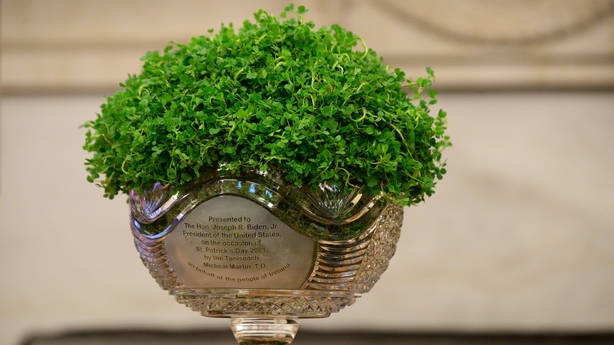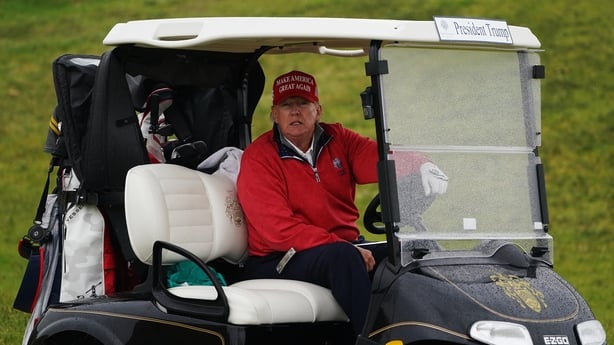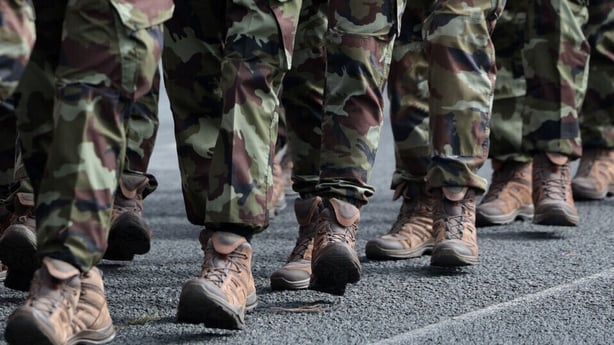Often the early days of a new government are characterised by swagger and optimism, but it is different this time.
Ministers privately speak of an eerie feeling in the air as international volatility takes hold.
The daunting political reality is that the Government cannot set its course with any great assurance until it gets a better read on the exact impact of the US President's economic and security policies.
The early indications offer little to assuage their deep concerns.
That makes the Taoiseach’s annual St Patrick’s Day trip to Washington the most high stakes visit in decades.
Already, Micheál Martin has publicly proclaimed that his primary duty is to protect Ireland’s economy.
The fact that the invitation has not actually arrived yet from the White House is totemic of the pervading uncertainty.
The official script is all prepared. It will emphasise the cultural links, and the economic relationship between the two countries which is valued at around a trillion euro per annum.
The problem is that US President Donald Trump believes that most of the trade is going in the wrong direction.
Ireland also serves as the gateway to the EU market for nearly 1000 US companies.
The Taoiseach can point out that Irish firms employ around 115,000 people in the US.
He will say too that tariffs create economic disruption and drive inflation, hurting all sides.
Unlikely that traditional agenda items will feature
It seems unlikely that the traditional agenda items, which focused on the undocumented Irish in the US along with continued support for the Good Friday Agreement, will feature prominently during this visit.
Even though the presentation of the bowl of shamrock is the centrepiece of this visit, Mr Martin is likely to be tasked by his EU partners to advocate on behalf of the 27 member states.

Former Ireland ambassador to the US, Dan Mulhall believes it fair to assume that the Taoiseach will have detailed conversations at EU level to hone the unified message before departing for Washington.
If the visit is deemed a success, could it even propel Ireland to act as a diplomatic bridge between the new US administration and the EU?
On the narrow issue of strengthening Irish-US relations, Mr Mulhall suggests that with the 250th anniversary of American Independence on the horizon, the role Irish people played in that struggle could be jointly celebrated.
"Delivering that message and not succumbing to political meekness as the US President watches on will be challenging."
Plus, an invitation to the new golf-loving US President to attend the 2027 Ryder Cup in Adare would probably go down well, he believes.
Given the Doonbeg connection and the fact that Mr Trump described the new US ambassador to Ireland, Edward Walsh, as a "champion golfer," the sport is likely be part of the conversation.

Before those niceties however Mr Martin will have to hold firm on Ireland’s position on Gaza, and its support for a two-state solution.
Delivering that message and not succumbing to political meekness as the US President watches on will be challenging.
Ireland's low spending on security will no longer float
There is another urgent issue to be addressed, that is the inability of Ireland to protect itself militarily after the US made it clear this week that it is no longer a guarantor of Europe’s defence.
Eoin McNamara, who is a Fellow at the Finnish Institute of International Affairs, believes this is a watershed moment and the US will no longer go along with Ireland’s low spending on security.
He feels that "Americans’ happy outlook on Ireland" disguised this reality for decades and it never became a major issue historically given that the Cold War largely passed Ireland by.
This country was in the words of the late TK Whitaker "an uninsured driver" when it came to defending its territory.
But that status will no longer be acceptable to either the US or the EU as Russia could well emerge from the war in Ukraine emboldened and with a keen eye for security weakness elsewhere, Mr McNamara contends.
Former Army Ranger Cathal Berry argues that the weaknesses are manifold with this country unable to either detect or deter hostile activity in its skies and seas.

This he says is putting key fibre-optic communications cables in jeopardy and it is a similar story for gas and electricity connectors.
He feels that Mr Martin’s recent comments about Ireland’s intention to "get serious about defending its critical interests" is a line that he will repeat in his meeting with Mr Trump.
"I think he was getting people ready for this, rather than saying it for the first time in the White House," Mr Berry said.
Others see the comments in a far different light.
Independent TD Catherine Connolly excoriated the Government this week over what she believes is a move to end the State’s policy of military neutrality.
"We have the tried and tested tools of propaganda: the shaming about how we should not be freeloading on other countries; the patriarchal approach that Government parties all know best; the use of fearmongering to tell us that we live in a very unsafe world; and the narrowing of the discussion to say "there is no alternative" to this consensus," she told the Dáil.
The Galway-West TD concluded her hard-hitting speech by saying the Taoiseach is refusing to reveal exactly what he will say to Mr Trump when they meet.
Indeed, it is unlikely those precise answers will be forthcoming in advance of this potentially era-defining meeting.







